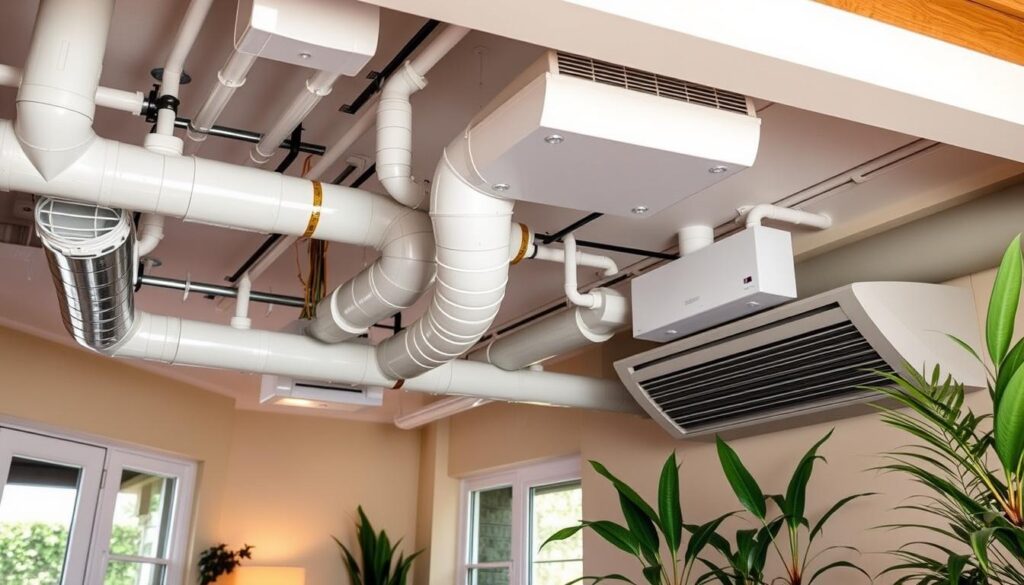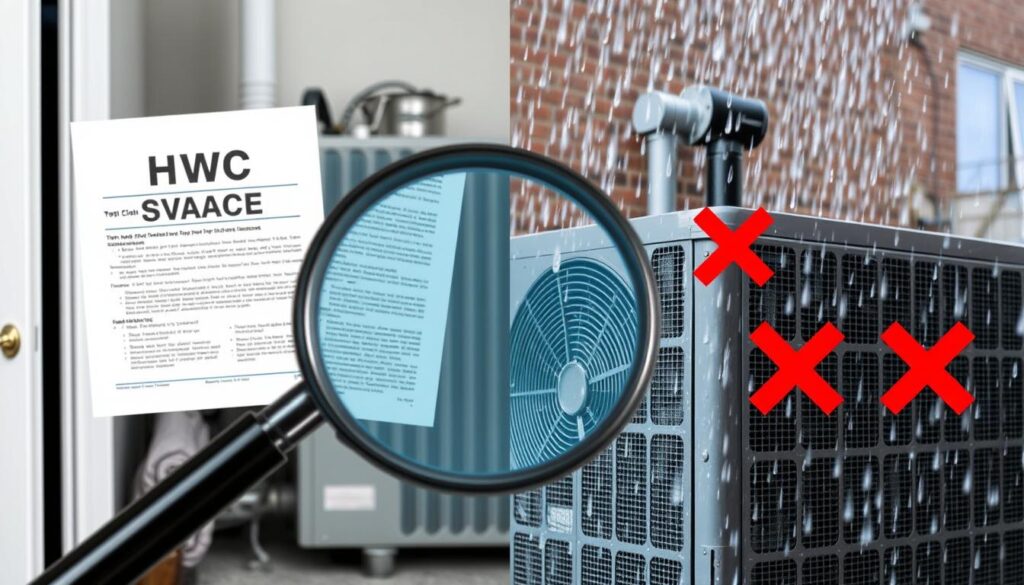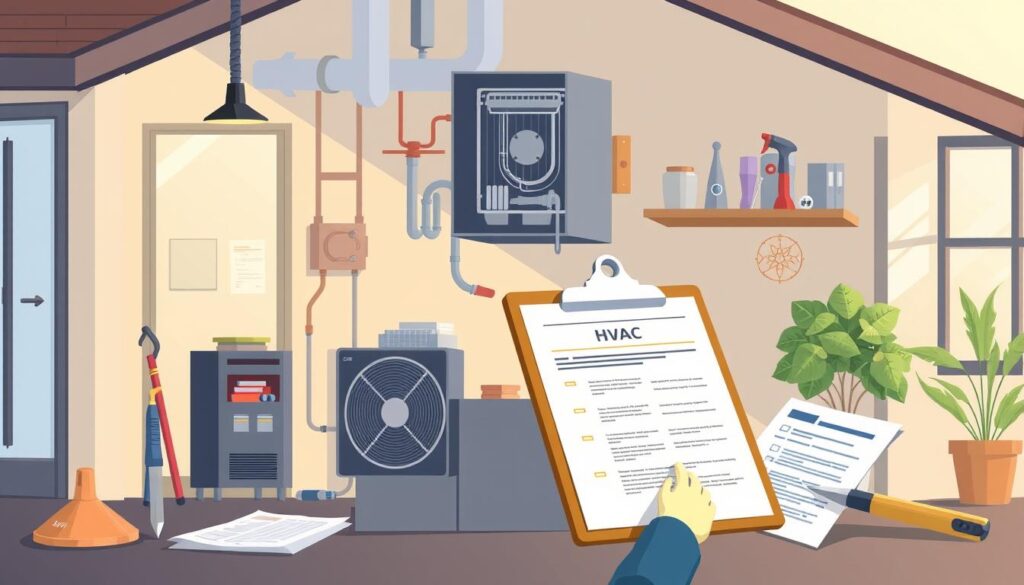Affiliate Disclosure
HVAC Guide Guys is a participant in the Amazon Services LLC Associates Program, an affiliate advertising program designed to provide a means for sites to earn advertising fees by advertising and linking to Amazon.
Does Homeowners Insurance Cover New HVAC System? Summer heat and winter cold make our HVAC systems key for comfort. But what if they break down or get damaged? Will your homeowners insurance help, or will you have to pay for repairs yourself?
Homeowners insurance can be a mixed bag for HVAC coverage. It might cover some issues, but there are also exclusions and limits. Knowing your policy well is key to protecting your HVAC systems.

Key Takeaways
- Homeowners insurance usually covers HVAC damage from things like fire, high winds, or theft.
- But, it won’t cover normal wear and tear, neglect, or age-related problems with HVAC equipment.
- The type of HVAC unit, like central or window, can affect your policy’s coverage.
- Damage from natural disasters like earthquakes or floods is often not covered by HVAC insurance.
- It’s important to understand your policy’s details to make sure your HVAC system is protected.
Table of Contents
Understanding HVAC Systems and Home Insurance Basics
Your HVAC system keeps your home comfortable all year. It’s key to know how it works and how it ties into home insurance. This knowledge helps protect your investment.
What Components Make Up an HVAC System?
An HVAC system has several important parts. These include:
- Furnace: Heats the air in your home.
- Air conditioner: Cools the air and lowers humidity.
- Ductwork: Spreads heated or cooled air around your home.
- Thermostat: Manages the system’s temperature and operation.
Types of Home Insurance Coverage
Homeowners insurance usually has three main types:
- Dwelling coverage: Protects your home’s structure, including built-in HVAC systems like central air.
- Personal property coverage: Covers your personal items, like portable HVAC units like window air conditioners.
- Liability protection: Helps if someone gets hurt on your property or if you’re found legally responsible for damages.
The Relationship Between HVAC and Insurance
How your HVAC system is covered by insurance depends on its type and the damage cause. Central air systems are usually covered under dwelling coverage. Window units are seen as personal property.
| HVAC Unit Type | Home Insurance Coverage |
|---|---|
| Central AC Unit | Dwelling Coverage |
| Window AC Unit | Personal Property Coverage |
Insurance usually covers HVAC damage from things like lightning, hail, or fallen trees. But, it doesn’t cover wear and tear, lack of maintenance, or defects from the maker.
Explore Our HVAC Shop
Looking for top-rated HVAC tools, parts, and accessories? Visit our shop and find the perfect solution for your needs.
Visit the ShopDoes Homeowners Insurance Cover New HVAC?
Homeowners insurance can be tricky when it comes to your new HVAC system. Your policy might offer some protection, but how much depends on your plan’s details.
Standard homeowners insurance might cover your HVAC if damage comes from a covered event like hail or lightning. But, it usually doesn’t cover wear and tear, lack of maintenance, or defects from the manufacturer.
To know what your HVAC is covered for, read your policy closely. Look for sections on dwelling, personal property, and equipment breakdown coverage. These can help protect your new heating and cooling system.
| Covered Perils | Exclusions |
|---|---|
|
|
Knowing what your insurance covers helps you protect your new HVAC coverage. It ensures your homeowners insurance HVAC replacement needs are met.
Explore Our HVAC Shop
Looking for top-rated HVAC tools, parts, and accessories? Visit our shop and find the perfect solution for your needs.
Visit the ShopCovered Perils That Affect HVAC Systems
Homeowners insurance can protect your HVAC system from many dangers. It covers damage from natural disasters and unexpected accidents. Knowing what your insurance covers is key.
Natural Disasters and Weather-Related Damage
Insurance usually covers HVAC damage from natural disasters like lightning, windstorms, and hail. These events can damage your heating and cooling system. But your policy can help pay for repairs or a new system.
It also covers damage from power surges or electrical issues during these disasters.
Accidents and Unexpected Events
Most policies protect your HVAC system from accidents. For example, if a tree falls on your AC or a fire damages it, your insurance can help. It also covers theft and vandalism of your HVAC equipment.
Theft and Vandalism Coverage
If thieves or vandals target your HVAC system, your insurance can cover the costs. This includes the outdoor unit, indoor air handlers, and ductwork or wiring.
Remember, coverage can vary by policy. Always check your policy to know what’s covered. Regular maintenance and keeping records can make filing claims easier.
| Covered Perils | Examples |
|---|---|
| Natural Disasters and Weather-Related Damage | Lightning strikes, windstorms, hail, power surges |
| Accidents and Unexpected Events | Tree falling on HVAC unit, fire, theft, vandalism |
| Theft and Vandalism | Stolen HVAC components, damage to outdoor unit |
“Homeowners insurance can provide valuable protection against a variety of covered perils that can affect your HVAC system, from natural disasters to unexpected accidents.”
When Insurance Won’t Cover Your HVAC System
Homeowners insurance can protect your HVAC system, but there are limits. Knowing what your policy covers is key to avoid unexpected costs.
Damage from normal wear and tear or lack of maintenance is often not covered. Insurance doesn’t help with issues from the system’s aging or neglect. Also, defects from the manufacturer are usually not covered.
Some cosmetic damage to your HVAC unit might not be covered. If the unit works fine but looks damaged, your insurer might not pay for it.
Furthermore, some natural disasters or weather events are not covered by basic policies. This includes damage from earthquakes, floods, or other excluded perils. You’ll have to pay for repairs or a new system yourself.
| Covered Perils | Excluded Perils |
|---|---|
|
|
To protect your HVAC system, review your homeowners insurance policy carefully. Understand the HVAC insurance exclusions and uncovered HVAC damage scenarios. This way, you can find the right coverage for your needs.

Explore Our HVAC Shop
Looking for top-rated HVAC tools, parts, and accessories? Visit our shop and find the perfect solution for your needs.
Visit the ShopUnderstanding Coverage for Different HVAC Unit Types
Homeowners insurance varies based on your HVAC system. Central air conditioning (AC) units and window units have different policies.
Central AC Units and Dwelling Coverage
Central AC units fall under the “dwelling” part of your policy. They’re seen as part of your home’s structure. If damage happens, like from a natural disaster, your insurance might cover repairs or a new unit.
Window Units and Personal Property Coverage
Window AC units, however, are seen as personal property. They’re covered under the personal property part of your policy. This coverage might have different limits and deductibles than your central AC system.
Knowing your policy’s HVAC coverage is key. Review it and talk to your insurance provider. This ensures you’re protected for both your central AC and window units.
“Regular maintenance and inspections can help extend the lifespan of your HVAC system and prevent costly breakdowns.”
Filing an HVAC Insurance Claim
When your HVAC system has a covered issue, filing an insurance claim can feel overwhelming. But, by taking a few key steps, you can make the HVAC insurance claim process easier. This way, your homeowners insurance HVAC claims will be handled well.
First, document the damage to your HVAC system. Take clear photos of the damaged parts, including the model and serial numbers. This visual proof is key when talking to your insurance company.
- Contact your insurance company right away to report the HVAC damage.
- An adjuster might come to check the damage and figure out what repairs are needed.
- Collect all important documents, like repair bills and maintenance records, to support your claim.
- Be ready to explain why your HVAC system failed, like if it was a natural disaster or something unexpected.
The claim process usually includes checking, approving, and paying for covered damages after you pay your deductible. It’s important to keep all talks with your insurance and repair people documented.
| Key Steps for Filing an HVAC Insurance Claim |
|---|
| 1. Document the damage with photos and gather unit details |
| 2. Contact your insurance provider promptly to report the incident |
| 3. Provide all relevant documentation, such as repair receipts |
| 4. Explain the cause of the HVAC system failure |
| 5. Remain organized and keep communication well-documented |
By following these steps, you can boost your chances of a successful HVAC insurance claim process. This ensures your homeowners insurance HVAC claims are handled efficiently.

Additional Coverage Options for HVAC Systems
Protecting your home’s HVAC system is more than just homeowners insurance. There are extra options to keep your heating, ventilation, and air conditioning (HVAC) equipment safe.
Home Warranty Programs
Home warranty programs cover HVAC repairs not usually covered by insurance. They protect your home’s big systems and appliances, like your HVAC unit. But, these plans have fees and deductibles, so think about the costs and benefits before you buy.
Equipment Breakdown Coverage
Equipment breakdown coverage is another choice. It’s an add-on to your homeowners insurance. It helps pay for HVAC repairs or replacement due to mechanical or electrical failures. This coverage costs about $25-$50 a year, which is cheaper than a full home warranty.
When looking at extra HVAC coverage, know what’s covered and what’s not. By understanding your needs and comparing costs, you can make sure your HVAC system is well-protected. This could be through homeowners insurance, a home warranty, or equipment breakdown coverage.
| Coverage Option | Average Annual Cost | Key Benefits |
|---|---|---|
| Home Warranty | $300 – $600 | Comprehensive coverage for HVAC and other home systems |
| Equipment Breakdown Coverage | $25 – $50 | Protects against mechanical and electrical failures |
Explore Our HVAC Shop
Looking for top-rated HVAC tools, parts, and accessories? Visit our shop and find the perfect solution for your needs.
Visit the ShopCost Considerations and Insurance Premiums
Protecting your home’s HVAC system can get expensive. Your homeowners insurance might change based on your HVAC coverage. Things like your deductible, coverage limits, and HVAC system’s age and condition play a big role.
Choosing a higher deductible can lower your insurance costs. But, you’ll have to pay more when you file a claim. Finding the right balance between cost and protection is key when picking your HVAC coverage.
| Coverage Factor | Impact on HVAC Insurance Costs |
|---|---|
| Deductible Amount | Higher deductibles = Lower premiums, but higher out-of-pocket costs for claims |
| Coverage Limits | Higher limits = Higher premiums, but more protection for your HVAC system |
| HVAC System Age and Condition | Older, less efficient systems may lead to higher HVAC insurance costs and homeowners insurance premiums |
It’s crucial to review your homeowners insurance policy. Talk to your insurance provider about your HVAC coverage needs. This way, you can find a good balance between affordable premiums and the protection your HVAC system needs.
“Homeowner’s insurance coverage for HVAC repairs or replacements is relatively rare compared to average maintenance or repair issues.”
Understanding the costs and coverage options helps you make a smart choice. This ensures your HVAC system is well-protected without overpaying for your homeowners insurance premiums.
Maintaining Your HVAC System to Prevent Claims
Keeping your HVAC system in good shape is key to avoiding expensive repairs and insurance claims. By taking a few easy steps, you can make your system last longer, work better, and cut down on big problems. These issues can cause insurance troubles.
Regular Maintenance Requirements
To keep your HVAC system in top shape, schedule yearly professional checks. Also, follow these maintenance tips:
- Change air filters every 1-3 months to keep air flowing well.
- Clean the condenser coils and drainage lines to stop clogs and water damage.
- Fix small problems like odd noises or smells right away to stop them from getting worse.
Today’s heating and cooling systems are designed to last 15 to 20 years with the right care. Regular upkeep helps you get the best from your investment and avoids sudden repairs or replacements.
Professional Inspections and Documentation
It’s also vital to have your HVAC system checked by a pro at least once a year. These checks can spot problems early, and the report can be useful if you need to file a claim.
Make sure to keep detailed records of all maintenance, repairs, and inspections for your HVAC system. This shows your insurance company you’ve taken good care of your equipment. It’s important for getting claims approved.
By following these HVAC maintenance tips and keeping good records, you can avoid HVAC insurance claims. This ensures your system works well for many years.
Explore Our HVAC Shop
Looking for top-rated HVAC tools, parts, and accessories? Visit our shop and find the perfect solution for your needs.
Visit the ShopHow to Choose the Right Insurance Coverage for Your HVAC
Choosing the right insurance for your HVAC system is key to protect against damage and unexpected costs. Look at homeowners insurance policies for coverage limits, deductibles, and HVAC-specific clauses. Also, think about getting equipment breakdown insurance to protect your investment.
Work with an independent insurance agent to find the best policy for you. They can help you weigh the cost of premiums against the coverage you need. Remember, your HVAC system needs full protection, as homeowners insurance might not cover all damages or issues.
Key Considerations When Selecting HVAC Insurance
- Understand the coverage limits and deductibles for HVAC-related claims in your homeowners insurance policy.
- Explore the need for equipment breakdown coverage, which can provide protection against unexpected mechanical or electrical failures.
- Review the specific perils and scenarios that are covered, such as natural disasters, accidents, and theft, to ensure your HVAC system is adequately protected.
- Consider the age and type of your HVAC unit, as central air conditioning systems may have different coverage compared to window units.
- Maintain detailed records of HVAC system maintenance and repairs to support any potential insurance claims.
By carefully selecting HVAC insurance and homeowners insurance comparison, you can protect your heating, ventilation, and air conditioning system from many risks. Invest in the right coverage to keep your home and budget safe.
“Protect your HVAC system with the right insurance coverage. It’s an investment worth safeguarding.”
Conclusion
It’s key to know what your homeowners insurance HVAC protection covers. Standard policies usually protect against damage from fires, lightning, windstorms, and theft. But, they don’t cover wear and tear or maintenance issues.
For full HVAC insurance summary, look into extra coverage like home warranties or breakdown insurance. Keeping your HVAC system well-maintained can prevent expensive repairs. Knowing your policy well helps you handle insurance claims smoothly.
Understanding your HVAC coverage and keeping up with maintenance is crucial. This way, you can protect your investment from unexpected problems. Working with a reliable HVAC service like Comfort Air ensures your system is well cared for and your insurance is up to date.

